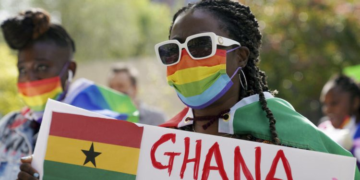The United States of America has criticized the recent passage of the Human Sexual Rights and Family Values Bill, commonly known as the anti-gay bil by Parliament . The controversial legislation was approved on Wednesday, February 28, following extensive debates, contributions, and some opposition within the parliamentary chambers.
The spokesperson for the U.S State Department, Matthew Miller, in a press statement, expressed concern over the potential negative impact of the bill on Ghana’s public health, media, civic spaces, and economy. He pointed out that the legislation not only contradicts Ghana’s tradition of tolerance, peace, and respect for human rights but could also have far-reaching consequences.
According to Miller, the passage of the bill threatens Ghana’s longstanding reputation as a model of stability and prosperity, with a tradition of tolerance that has been admired globally. He emphasized that the legislation is inconsistent with the values that have characterized Ghana’s approach to human rights and could undermine the nation’s laudable tradition.
Below is the spokesperson’s full statement.
Ghanaian Parliament’s Passage of Legislation Undermines Human Rights
Matthew Miller, Department Spokesperson
The United States is deeply troubled by the Ghanaian Parliament’s passage of legislation, officially called the Human Sexual Rights and Family Values Bill, which would threaten all Ghanaians’ constitutionally protected freedoms of speech, press, and assembly.
The bill seeks to criminalize any person who simply identifies as LGBTQI+, as well as any friend, family, or member of the community who does not report them. Limiting the rights of one group in a society undermines the rights of all.
The United States echoes the call by those Ghanaians who have urged a review of the constitutionality of the bill to protect the rights of all individuals in Ghana.
The bill would also undermine Ghana’s valuable public health, media and civic spaces, and economy. International business coalitions have already stated that such discrimination in Ghana would harm business and economic growth in the country.
Ghana’s tradition of tolerance, peace, and respect for human rights is a source of stability and prosperity that has long served as a model for countries around the globe. This legislation is inconsistent with these values and will, if it becomes law, undermine this laudable tradition.

































